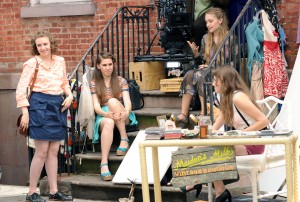Many of the millennial stereotypes are there, and they never fail to make a twenty-four-year-old college graduate chuckle even if the content may occasionally be simplistic and reductive. Much like Lena Dunham’s debut feature film Tiny Furniture, the television show seeks to comment on the current generation of sometimes underemployed but always self-consciously individualistic recent college graduates currently inundating neighborhoods such as Williamsburg and Greenpoint. Dunham’s character Hannah says it best when she concedes she and many others her age are ‘slaves’ to a city that does not want them. In actuality, the ‘slaves’ part would apply to just about every single person born in the 1980s carrying a Bachelor’s degree. Whether or not every single resident, aspiring or actual, remains unwanted by the great metropolis is up for debate, however.
What’s indisputable is the main characters on Girls share the malaise of a generation of university-educated individuals facing a future that offers them little more than uncertainty and the virtual inevitability of broken promises. What does one associate with the millennial generation? Gender neutrality? Well that’s certainly a motif running through all of Dunham’s work. Whether or not she is partial to the prevalence of feminized men among the twenty-something cohort is not always easy to tell, but one thing made clear all too often is that the classically conceived relationship between a dominant man and a submissive woman becomes seemingly more elusive with each passing year. One does not need to be particularly perceptive to realize how impotent many of the male characters on the show can sometimes be.
Hand in hand with underemployment and individualism comes “white privilege”, something most of the characters in Dunham’s work are quite privy to and admittedly so, as well. How else would one describe recent liberal arts graduates getting some assistance on the side from their immediate elders? Dunham’s character Hannah is trying to become a novelist and is certainly not starving in the process. Many would associate such characteristics with the increasingly common symptoms of what many members of the boomer generation would choose to label delayed adulthood.
Needless to say, the show remains entertaining and addictive, due to its relentlessly raw humor and admirable attempt at honesty. As a result, it will remain popular for months and perhaps years to come, as many people in their twenties will manage to relate to it on some level, male or female, straight or not so straight. It’s hard to criticize the show’s creators when it’s clear their motive is ultimately to make fun of themselves, since they are well aware of their faults and adequately conscious of the superficialities that often go along with being a ‘young person’ in the 21st century. Dunham knows many young people, herself included, substantially predicate their self-worth on whether or not they reside in Manhattan or a fashionable section of Brooklyn, and she’s confessing to such vanity she sees in herself.

Let’s Talk Girls
February 26, 2013










